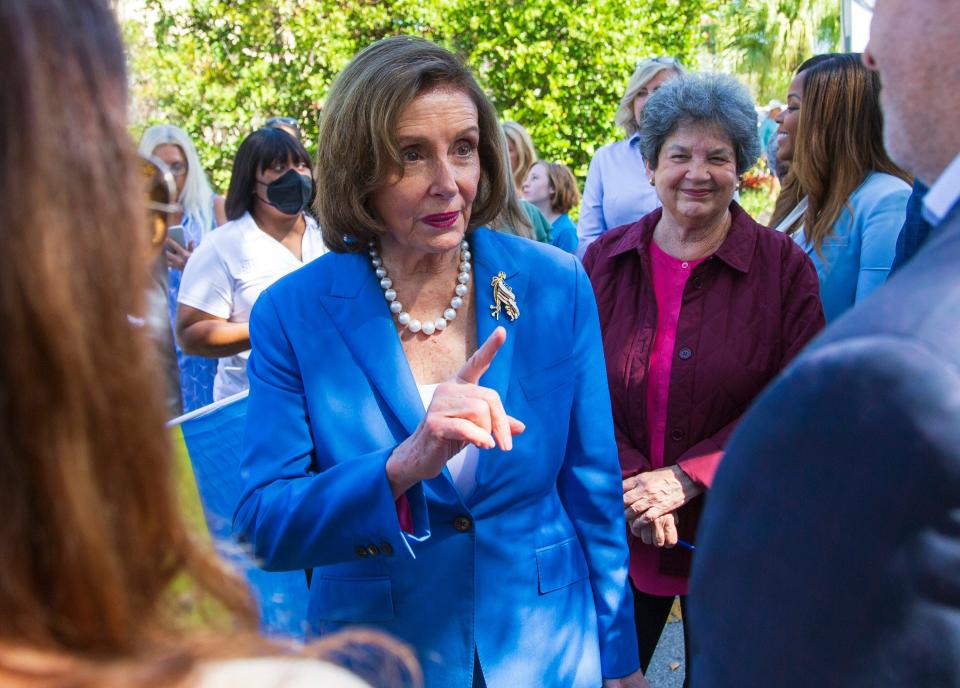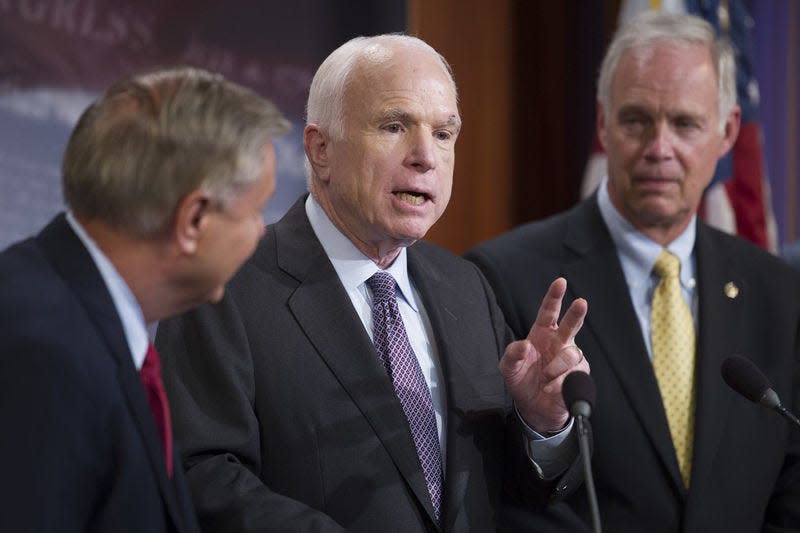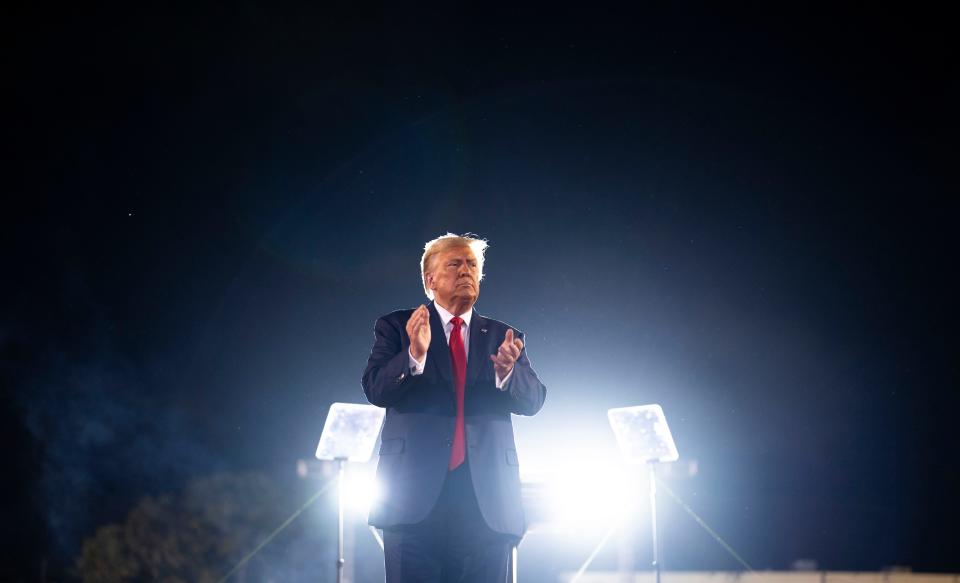Did Trump make "bad political move" by calling for repeal of Obamacare? Maybe, maybe not
- Oops!Something went wrong.Please try again later.
- Oops!Something went wrong.Please try again later.
- Oops!Something went wrong.Please try again later.
Did Donald Trump commit a "bad political move" in vowing to repeal Obamacare should he win the presidency again next year?
Judging by Affordable Care Act enrollments in Florida, yes. Judging by political polling and previous Florida election results, not so much.
Despite the former president's hostility to the health coverage program, dubbed Obamacare, it is nation-leading popular in his home state. According to one count, Florida tops the United States in the number of people enrolled in Obamacare plans (3.2 million), and the share of the population covered by them (15%).
Regardless of Trump's strident opposition to Obamacare — he came within a vote of repealing the plan in the U.S. Senate in 2017 — his political fortunes have only soared in Florida. Polls by both Florida Atlantic University and the University of North Florida show him leading the GOP primary field by wide margins, and Trump carried Florida by a relatively comfortable 3.3% margin in his failed 2020 re-election bid.
"There's certainly an irony there," said Michael Binder, faculty director of the Public Opinion Research Lab at the University of North Florida.
So what gives? Why does there appear to be such a disconnect between the embrace of the national health insurance law and voting results in Florida? Read on.
What did Trump recently say about Obamacare?
In a social media post on Nov. 25, Trump said he would "never give up" on efforts to "terminate" the health program signed into law by President Barack Obama in March 2010.
"The cost of Obamacare is out of control, plus, it’s not good Healthcare," Trump wrote. "I’m seriously looking at alternatives. We had a couple of Republican Senators who campaigned for 6 years against it, and then raised their hands not to terminate it. It was a low point for the Republican Party, but we should never give up!"
Florida Democrats immediately pounced on the statement.
“The Affordable Care Act has provided life-saving health care to millions of Floridians for over a decade,” said state Democratic Party chief Nikki Fried. “While Republicans continue trying to gut lifesaving policies, Democrats and President Biden are fighting to make health care more affordable and accessible for Floridians and all Americans.”
And on a press call Tuesday morning, former House Speaker Nancy Pelosi called Trump's statement a "bad political move" and said his statements show he remains "hellbent on destroying" the Affordable Care Act that millions of Florida seniors and families have accessed.
"So when he says he's going after our health care, believe him, because he's done it before," said Pelosi, who continues to represent a California district in the U.S. House.

The Biden campaign also tore into Trump in a statement.
"After failing to undercut the law during his presidency, Donald Trump is reviving his dangerous promise to repeal the Affordable Care Act, threatening to bar millions of Americans from health coverage for reasons they cannot control," the statement read.
The pushback got back to Trump, apparently, and in a pair of early morning posts on Wednesday Trump stated that "getting much better Healthcare than Obamacare for the American people will be a priority" of a second Trump administration. And he insisted the goal was not just to "terminate" the current program but to replace it with a "much better" plan.
What is Trump's record on Obamacare?
That "low point" reference in Trump's post on Truth Social was a midnight U.S. Senate vote in 2017 in which the late U.S. Sen. John McCain gave a thumbs-down vote on a repeal effort, preserving the bulk of the Affordable Care Act and earning the Arizona Republican Trump's unending enmity and animosity.

Trump's suggestion that he is "looking at alternatives" is curious as Obamacare "repeal and replace" was a GOP mantra up until 2017. When the time came for that repeal vote, however, the Republican congressional caucus and the Trump White House sought its elimination without presenting a viable alternative.
Last week's missive was not the first time Trump has voiced opposition to Obamacare since his return to the presidential campaign trail. In a February statement, for example, his campaign touted how Trump, as president, eliminated the Obamacare individual mandate and called the move "financial relief to low- and middle-income households that made up nearly 80 percent of those who paid the penalty for not wanting to purchase health insurance."
Obamacare is popular in Florida among enrollees — but not so much among some others
The mandate was a flash point in Florida, which is largely dominated by sole proprietors and small- and medium-sized businesses. A study released last month by The Digital Project Manager, a data analysis firm, reported that the Sunshine State leads the United States with the "highest percentage of the population who have started a business," with 13,238 small businesses per 100,000 of the population.
Over the past decade, business owners complained about the mandate as an extra tax and a form of intrusive government, or "socialism," requiring them to buy a service they felt should be an individual's choice.
Others griped that the mandate was a form of double taxation as Florida counties also charge a real-estate tax line item to provide hospital networks money precisely to cover uninsured people.

Nonetheless, Florida Democrats point out that voiding Obamacare would impact Miami-Dade County especially hard as nearly 750,000 "mostly" Hispanic residents in Doral and Hialeah "would be left without coverage if Trump gets his way." And some business groups praised the plan for providing an avenue for employee coverage without a cost impact on smaller enterprises.
But in Hialeah, a Nov. 8 Trump rally was packed, and city officials have said they will name a street after Trump. And Trump made major gains in winning over Latino voters in Miami-Dade three years ago, which was a major reason he won Florida with an ample vote margin.
So why is there an apparent disconnect between both Trump's and Obamacare's popularity in Florida?
Binder, the pollster at UNF, said part of the answer is mathematics.
Florida now lists significantly more active Republican registered voters than Democrats, he noted.
"You may find there are more folks loving it on the left than the right," he said. "If every single Democrat loves the program you could still have big support for it but still there are more Republicans than there are Democrats in this state so that's part of it too."
Still, Binder said Republicans wanting to see the plan eliminated also face a political uphill fight.
Happy Thanksgiving? Trump split screen holiday greetings rip "Radical Left," laud military, first responders
"The one thing is you have seen throughout history is once they are instituted they are very difficult to unravel because you have built in a constituent base that is, I don't want to say they are dependent upon it, but certainly enjoying the benefits of its existence," he said.
Two examples of that are Social Security and Medicare, he added.
"That's why when Trump had the opportunity several years ago it didn't work for them," Binder said.
Gary Segura, principal and co-owner of BSP Research, said there are two other reasons: Voters may not "fully" understand the political nuances and there are other issues more determinative for them during elections.
Segura's firm on Thursday released a poll of Florida Hispanics showing that while concerns about health care ranked third, the respondents barely distinguished between Republican and Democratic platforms.
Segura said 66% of state Hispanics cited the high cost of health care and monthly premiums as a worry, while another 54% checked off the cost of medications. And 79% supported expanding Medicaid, which Florida GOP leaders adamantly refuse to do.
"It's pretty ongoing, I mean that's a broad command," he said of the poll conducted for the advocacy groups UnidosUS and Mi Familia Vota. "Medicaid expansion is super popular."
However, when asked which party they trust to handle Medicaid, just 40% said the Democrats while 28% cited Republicans. Another question querying their view of which party is closer to their values on health care drew 39% for Democrats and 33% for Republicans — nearly even.
Segura said the public doesn't always "fully understand the issue positions of many elected officials" because it's not often clear. That's also prevalent among lower-income electorates who may not have access to media and information sources.
The other reason is there may be other issues that are perceived as more pressing, he said. Oftentimes, Segura added, the topics that drive voters to the polls are those with a religious context, like abortion and social issues, big perceptions of who is weak and strong, etc.
On health care, it's not that the electorates don't care, it's just not the issue that drives their decision when casting ballots.
"The reason is they are not voting on the basis of health care. They are just not voting on that issue," Segura said. "And there are lots of reasons why people vote for individuals who espouse policy positions that are not necessarily in their interests. That's not really new."
Pelosi: Democrats need to talk with 'clarity' to Floridians, especially seniors
Pelosi largely attributed the disconnect to messaging.
She said people, and voters in particular, are looking at a range of issues and may not necessarily be zeroed in on how ending the Affordable Care Act will impact their health and pocketbooks.
However, unlike issues such as raising the minimum wage, Pelosi insisted health care coverage is "universal" and affects everyone. And a political call to take away a valued program will resonate, she said.
"When things are granted and you say 'please vote for us because we are going to do this,' it has one effect," she said. "When you say, 'we're going to take this away,' it has a completely different effect."
She said Democrats, going forward, will make the argument that ending the Affordable Care Act will prove costly to people with pre-existing medical conditions and to young adults no longer able to stay on parents' plans until age 26.
"This is a kitchen-table issue to the nth degree," she said. "The Affordable Care Act will be on the ballot. The American people will need to know if Donald Trump wins next year, he is coming for your health care. But if Joe Biden wins, your health care will be safe and sound."
Nationally, she said, 40 million Americans will be "kicked off" health plans and 150 million people with pre-existing conditions will be at risk of having health insurance coverage denied. In addition, she cited efforts by Republicans, including from Florida, to repeal the Inflation Reduction Act and its subsidies to lower health insurance premiums and cut prices for medications, including the $35 cap on insulin.
"This is something the American people truly understand, their own access to health care," Pelosi said. "It is about their financial well-being as well as their health and security."
The Democrats' position, Pelosi insisted, will resonate with Florida's large senior population.
"There are people in Florida with pre-existing medical conditions, some of them are older," she said. "This has an impact on them because it's part of an assault on anti-governance."
The more they learn about what Republicans' goals are, the more they "will use their vote accordingly," Pelosi said. It is similar to the way in which President Biden called out U.S. Sen. Rick Scott's proposal to sunset some federal programs in this year's State of the Union address, forcing the Florida Republican to backtrack and exempt Social Security, Medicare, Veterans Administration and defense and national security programs from his legislation.
Democrats, she added, need to speak in positive and hopeful, but also firm, terms that "make clear their vote has ramifications" on policies that directly impact their well-being and household finances.
"We don't want to be fearmongers, but we have to make the contrast and we have to have clarity about 'this is what it means to you'," she said. "This assault is on you, your health, your financial security and, again, the health of America."
Antonio Fins is a politics and business editor at The Palm Beach Post, part of the USA TODAY Florida Network. You can reach him at afins@pbpost.com. Help support our journalism. Subscribe today.
This article originally appeared on Palm Beach Post: Trump call to repeal Obamacare not such a bad move in red Florida

